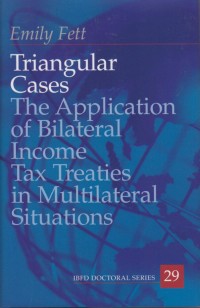
Book
Triangular Cases: The Application of Bilateral Income Tax Treaties in Multilateral Situations
Bilateral income tax treaties do not always operate effectively in situations where more than two states are involved. These situations are known as "triangular cases" and they typically arise where a person who is resident in two states for tax purposes (a dual resident), or a person who is resident in one state and has a permanent establishment (PE) in another, has dealings with a resident of a third state. This thesis explores the issues presented by the application of bilateral tax treaties in PE triangular cases, dual resident triangular cases and reverse triangular cases, and outlines potential solutions. The main focus of this book is PE triangular cases: situations where a person which is resident in one state (the residence state) earns income from sources in a second state (the source state) that is attributable to a PE of the recipient in a third state (the PE state). Such situations give rise to numerous issues. Key among these is the fact that the source state is not required to apply the conditions of the treaty between the PE state and the source state, even though the treaty between the residence state and the PE state will allocate the prior (and perhaps exclusive) taxing rights to the PE state. This book argues that this approach should be reconsidered. It argues that residence concepts do not always provide a strong foundation on which to base eligibility for treaty benefits, that the PE concept and, in particular, the attribution of income to the PE, represents a sufficiently strong connection to the PE state to support a treaty claim, and that treaty-shopping concerns can be sufficiently addressed. As part of this analysis, this book examines the most fundamental questions associated with tax treaties: when should they apply, how should they apply, and what all those familiar concepts really mean. The topic of triangular cases has a long history, but ultimately the issues involved are fresher and more relevant than ever. Ultimately, it is through examining these more unusual and difficult situations, that one is able to come to a deeper understanding of the issues faced every day.
Detail Information
| Call Number |
17 TRI emi
|
|---|---|
| Publisher | IBFD : The Netherlands., 2014 |
| Collation |
xxii, 874 p.; 23.7 cm
|
| Language |
English
|
| Classification |
17 TRI emi
|
| ISBN/ISSN |
978-90-8722-230-7
|
| Edition |
IBFD Doctoral Series
|
| Subject(s) |
-
|






